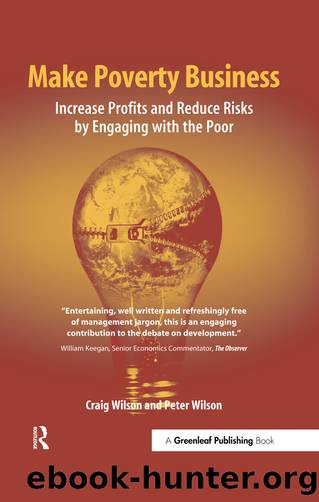Make Poverty Business by Wilson Craig;Wilson Peter; & Peter Wilson

Author:Wilson, Craig;Wilson, Peter; & Peter Wilson
Language: eng
Format: epub
Publisher: Taylor & Francis Group
The collective benefits for a group of businesses to reduce crime in their operating areas are clear and range from reduced insurance premiums through to the efficiency gains of sharing the costs of security rather than making expensive individual provisionâthereâs little point in each business putting their own CCTV camera on a lamppost when they could all share the costs of putting up just one.
But, if we are being rigorous about the business case, we have to consider the economic old chestnut of the âfree-riding problemââwhy not let everyone else fund the programme and just reap the benefits, because less crime in your city will benefit you whether or not youâre a member of the scheme? Of course, the problem with this attitude is that, if everyone thinks the same, then no one will join in and the collective action wonât happen at all.
The classic theoretical case of this free-rider problem is the lighthouseâas a ship owner you get the benefits of a lighthouse whether or not youâve contributed to the cost of its construction. For years, many economists said that lighthouses could only be provided by the government, and, if the government werenât able or willing to do the job, then they just wouldnât be built. But this was confounded by the historical factsâprivate entrepreneurs did make money by building lighthouses. They did so by linking lighthouses to nearby ports; you could charge ship owners for access to ports and you could use some of that money to pay for the lighthouse. Thus shipowners paid for a bundle of benefits which included port access (where access could be controlled and so payment could be made compulsory) and the benefits of a nearby lighthouse.
Now this is the sort of thing that Nobel Prize winners argue about and we fear weâre already getting lost in too much detail. But the important thing for us is to note that collective action on crime does take place, just as private lighthouses did exist, regardless of what the theory says, and our job is to explain how we can achieve similar results elsewhere. It seems very likely that, just as in the lighthouse case, when a company pays for a public benefit such as crime control, it also gets some private benefits. The private benefits of joining the crime control club might include access to business opportunities from being part of an influential network of business people and politicians (or, more accurately, avoiding the danger of being ostracised by them if you do not chip in). You also gain the opportunity to influence police priorities and to gain intelligence and understanding which you can use to guide your own security activity.
Of course there is a risk to these types of activities. You do not want to make a police or security force more efficient if that just means it can crack more heads, repress more people and better prop up a disgraceful regime. The security force has to be have some degree of legitimacy
Download
This site does not store any files on its server. We only index and link to content provided by other sites. Please contact the content providers to delete copyright contents if any and email us, we'll remove relevant links or contents immediately.
The Secret History by Donna Tartt(19017)
The Social Justice Warrior Handbook by Lisa De Pasquale(12179)
Thirteen Reasons Why by Jay Asher(8879)
This Is How You Lose Her by Junot Diaz(6867)
Weapons of Math Destruction by Cathy O'Neil(6257)
Zero to One by Peter Thiel(5778)
Beartown by Fredrik Backman(5726)
The Myth of the Strong Leader by Archie Brown(5489)
The Fire Next Time by James Baldwin(5421)
How Democracies Die by Steven Levitsky & Daniel Ziblatt(5207)
Promise Me, Dad by Joe Biden(5138)
Stone's Rules by Roger Stone(5073)
A Higher Loyalty: Truth, Lies, and Leadership by James Comey(4944)
100 Deadly Skills by Clint Emerson(4908)
Rise and Kill First by Ronen Bergman(4766)
Secrecy World by Jake Bernstein(4735)
The David Icke Guide to the Global Conspiracy (and how to end it) by David Icke(4694)
The Farm by Tom Rob Smith(4498)
The Doomsday Machine by Daniel Ellsberg(4477)
